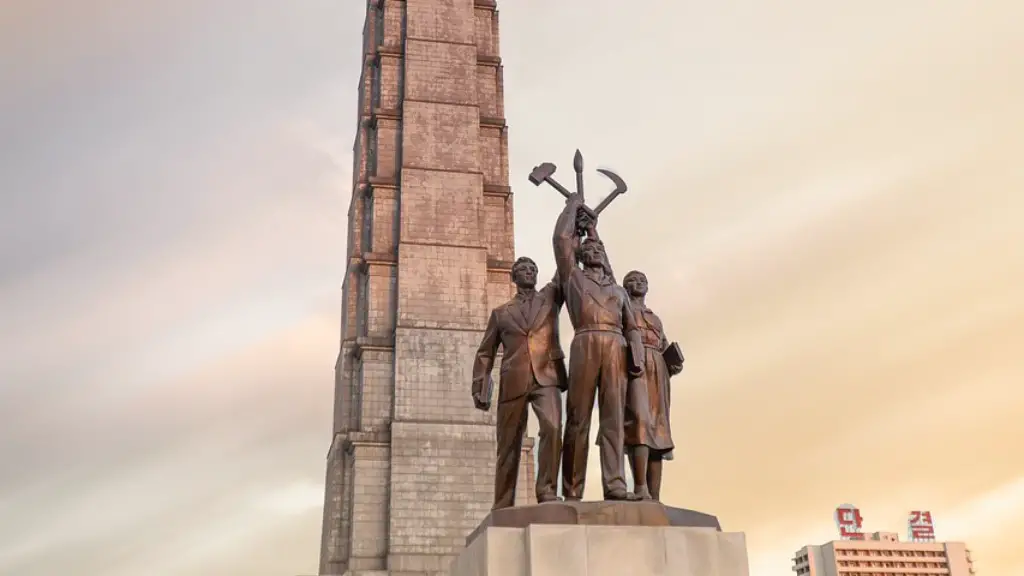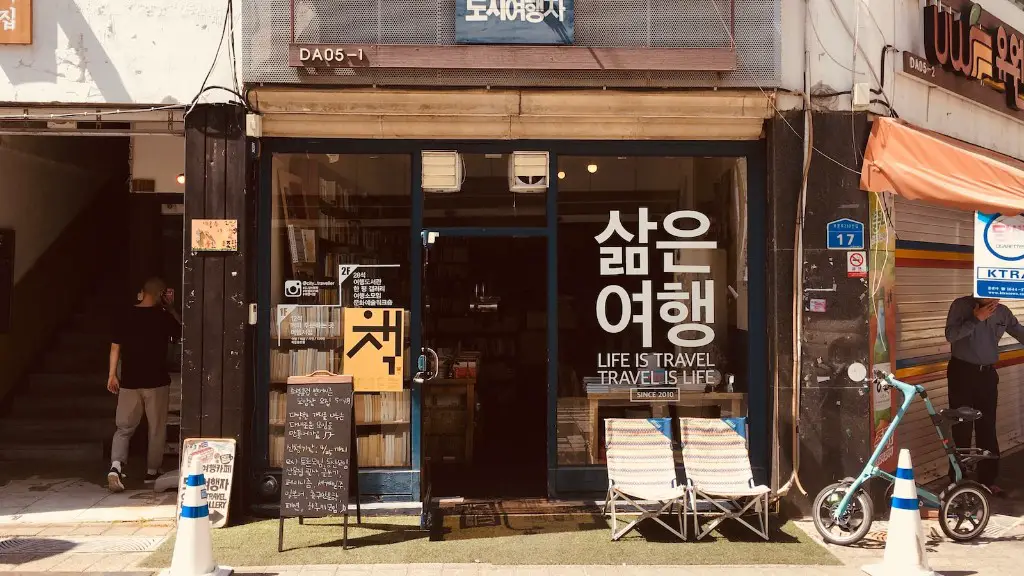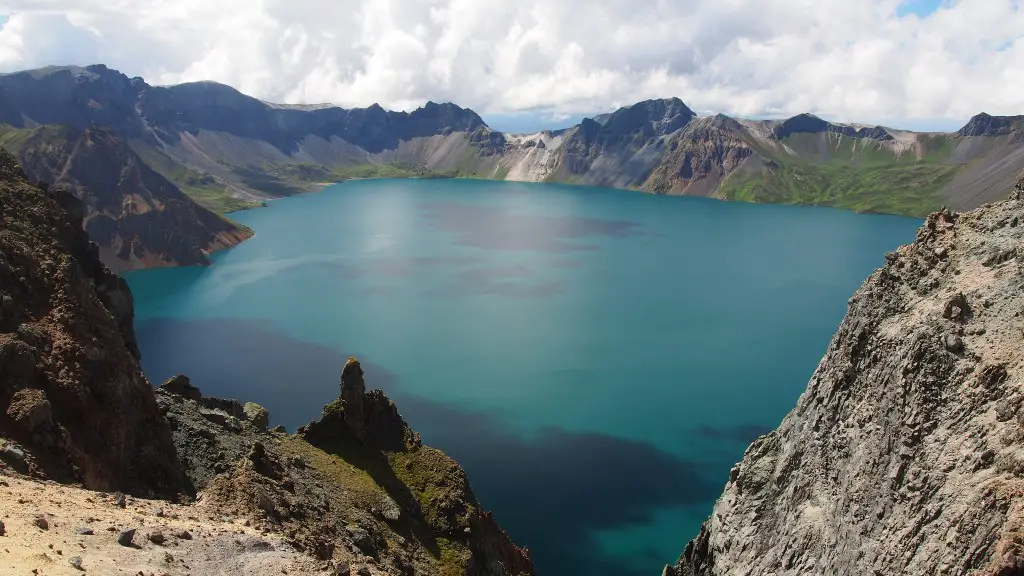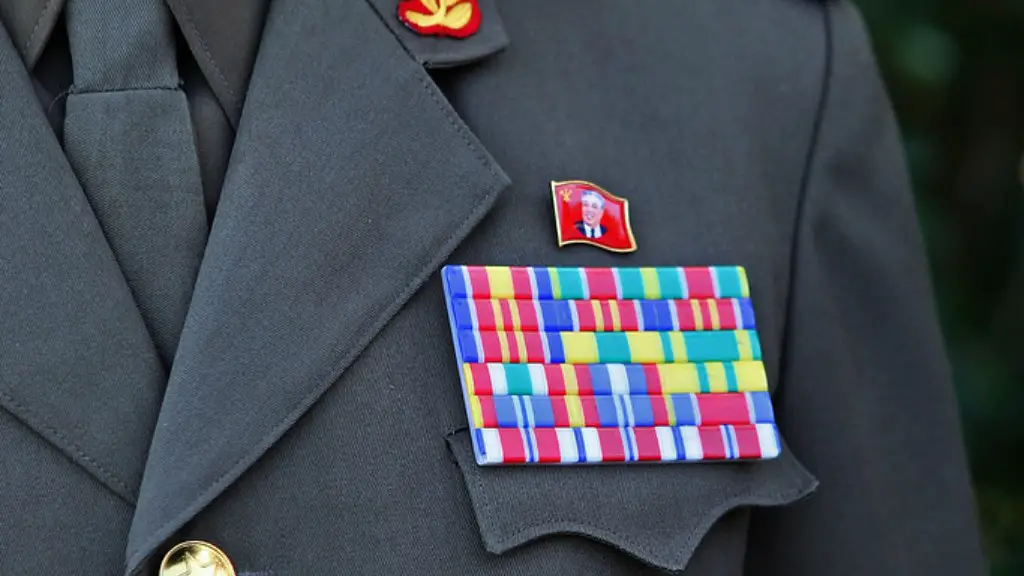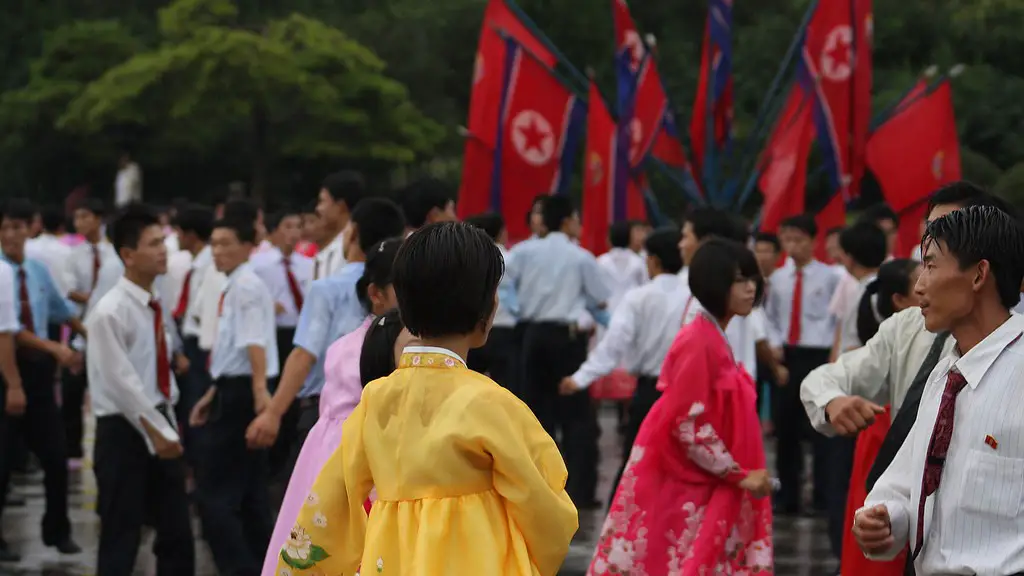The Democratic People’s Republic of Korea (DPRK) is governed by a single political party known as the Workers’ Party of Korea (WPK). The WPK is led by the Supreme Leader, who holds absolute power and leadership. The current supreme leader and head of House of Kim is Kim Jong-un, the third son of former leader Kim Jong-il and the grandson of founder Kim Il-sung.
Under his rule, Kim Jong-un has maintained the WPK’s policy of Juche (a form of national self-reliance), which is stated in the party’s slogan: “The great reader is the master of the destinies of the Korean revolution.” As the leader of North Korea, Kim Jong-un has a wide-ranging number of responsibilities, including the direction of the country’s economic, political and military policies, as well as overall responsibility for the welfare of the North Korean people. He also leads the WPK’s foreign policy and is the Chair of the Central Military Commission, which oversees the Korean People’s Army.
Kim Jong-un was officially designated as the Supreme Leader of North Korea on December 30, 2011, upon the death of his father, Kim Jong-il, who had held the post since 1994. Much like his father before him, Kim Jong-un has exercised tight control over his country and its citizens since coming to power. He has strengthened alliances with foreign countries, made sure to ensure the presence of a strong military, and has embarked on a series of economic reforms.
Naturally, Kim Jong-un’s rule of North Korea has been widely criticized, both domestically and abroad. He has been accused of a variety of human rights abuses and of fostering a repressive and authoritarian government. Even so, his policies have been successful in maintaining an atmosphere of stability and solidifying his rule, at least for the time being.
With that being said, one of the most effective ways in which Kim Jong-un has consolidated his power has been through the use of propaganda. The media within the country is strictly controlled, and only stories and images supporting the regime are allowed. The message it sends is that Kim Jong-un is the only one with the power to lead the people, and it helps to reinforce loyalty to the regime.
Despite the criticisms and controversies surrounding Kim Jong-un and his rule, it is clear that North Korea is firmly under his control. He is the undisputed leader of the country and has no plans to relinquish his power any time soon. However, only time will tell what the future holds for North Korea and its supreme leader.
Economic Reforms
One of the first steps taken by Kim Jong-un to shore up the North Korean economy has been to implement a series of economic reforms, such as opening up the country to more international trade deals. This has allowed North Korea to export goods to other countries, as well as bring in foreign investments which can stimulate economic activity. Additionally, the reforms have helped to broaden the range of products that can be purchased domestically.
In addition to opening up to foreign investments, Kim Jong-un has also made attempts to reduce the country’s reliance on agriculture by promoting industrialization and technological advancement. This has helped to create a more diverse and prosperous economy, which is less vulnerable to changes in the global market. Furthermore, North Korea has also opened up the financial sector, allowing for increased access to banking services for its citizens.
Though Kim Jong-un’s efforts have been met with some success, many experts are of the opinion that a more comprehensive reform package must be implemented if the North Korean economy is to become sustainable in the long-term. Critically, North Korea must be willing to open its borders to foreign persons, companies, and technologies in order to truly modernize the economy.
Additionally, it is essential that the country make more efforts to generate foreign currency, as most of its population is living in poverty. To this end, North Korea must be willing to embrace the international market and take part in global trade if it is to move beyond its current economic struggles.
Foreign Relations
The DPRK possesses diplomatic relations with more than 160 countries, including most of its neighbours. China is the DPRK’s closest ally, and the two countries have strong political, economic and military ties. Additionally, North Korea has traditionally enjoyed close ties with Russia, though relations between the two have been strained in recent years.
In the past, North Korea has occasionally engaged in open hostilities with South Korea, resulting in tensions between the two countries. However, in recent years, the two sides have taken steps to move beyond the Cold War era of animosity, and have made strides towards establishing and maintaining closer ties. This has resulted in a series of summits between the countries and their respective leaders, which have led to a number of agreements on issues such as reunifying families separated by the Korean War, reducing military tensions and establishing economic ties.
Likewise, North Korea has also taken steps to improve relations with the United States. The two countries have engaged in direct negotiations on issues such as denuclearization and the lifting of sanctions, leading to a number of agreements between the two. As of 2020, the U.S. and North Korea have had two official summits and there have been positive signs that relations between the two countries are continuing to improve.
Overall, Kim Jong-un has been successful in improving the DPRK’s standing internationally, and he has taken steps to reduce tensions with a number of countries. While it may still be too early to say whether or not this will lead to a lasting peace, it is nevertheless a positive step forward for the Korean peninsula.
Military
The Korean People’s Army (KPA) is the primary branch of the North Korean military, with Kim Jong-un as its Supreme Commander. The KPA is the largest branch in terms of personnel, with an estimated 1.2 million active troops and four million reserves. The KPA is primarily responsible for the protection of the country and its citizens, though its troops can also be deployed abroad in the event that its leadership deems it necessary.
The KPA is well-equipped with a wide range of modern weapons, including tanks, artillery, infantry fighting vehicles, and aircraft. Additionally, it has an extensive arsenal of nuclear weapons at its disposal, as well as a considerable stockpile of missiles which can be used to attack both land and sea-based targets. It is believed that the KPA also possesses a considerable number of cyber capabilities which can be used for both defensive and offensive operations.
The KPA enjoys a high level of public support among North Koreans, and the population is largely supportive of its actions. Since coming to power, Kim Jong-un has sought to strengthen the military’s capabilities and expand its influence. This has resulted in significant increases in defence spending, and the KPA is now better equipped and better prepared than ever to protect the nation.
Moreover, Kim Jong-un has also made efforts to appear more compassionate and understanding towards the everyday needs of North Koreans, such as providing food aid and improving access to medical care. These gestures, combined with Kim Jong-un’s staunch support for the military, have helped to bolster the public’s opinion of the Kim regime and have made it much easier for him to maintain his grip on power.
Life Under Kim Jong-un
The vast majority of North Koreans live in the countryside, with only a small fraction residing in cities. Due to the country’s closed economy, most citizens are unable to access the same products and services that are available in the more developed world. In terms of living standards, the majority of North Koreans live in relative poverty.
Under Kim Jong-un’s reign, North Korea’s political environment remains highly repressive, with limited personal liberties and a pervasive system of propaganda and censorship. Those who oppose the government are viewed with suspicion and are subject to harsh punishments, ranging from imprisonment to execution. Additionally, the Kim regime is known to employ a variety of human rights abuses against its citizens, including forced labor, sexual exploitation, and forced abortion.
Despite the shortcomings of living in North Korea, the population remains loyal to the Kim regime and appears to largely support Kim Jong-un’s rule. This is not surprising, as the DPRK leadership has gone to great lengths to apply a wide range of incentives and punishments, such as providing access to foreign goods or revoking welfare benefits, in order to keep its citizens in line. Additionally, propaganda and a heavily censored media have done much to shape public opinion and bolster the government’s popularity.
Kim Jong-un’s rule of North Korea has unquestionably seen some success, both in terms of maintaining control over the country and improving its international standing. However, it remains to be seen if the leader will be able to maintain his grip on power and continue to improve the quality of life for North Koreans in the years to come.
Regional Stability
As the leader of North Korea, Kim Jong-un has an essential role to play in maintaining regional stability. In recent years, the leader has taken steps to reduce tensions with a number of countries, including South Korea, the United States, and Japan. In addition, Kim Jong-un has also engaged in a number of diplomatic initiatives which have helped to improve relations with neighbouring countries.
Moreover, Kim Jong-un’s decision to cease nuclear testing was widely viewed as a positive step forward for regional stability. The move, which came after months of negotiations with the United States and other world powers, was seen as a major concession and sign of goodwill from the North Korean government. In return, Kim Jong-un was rewarded with a number of economic and political incentives from the international community, which helped to improve North Korea’s standing abroad.
That being said, it is still unclear if Kim Jong-un’s efforts to reduce tensions and improve Korea’s international relations will bear lasting fruit and lead to a more peaceful and prosperous region. With the looming threat of nuclear war still looming and a number of economic sanctions still in place, it is clear that much work remains to be done.
Ultimately, whether or not Kim Jong-un’s rule will be a successful one will depend largely on how the leader of North Korea chooses to deal with both internal and external issues. If he continues to pursue a path of reform and reconciliation, then it is possible that North Korea will be able to move beyond its long-standing adversity and achieve a lasting peace.
